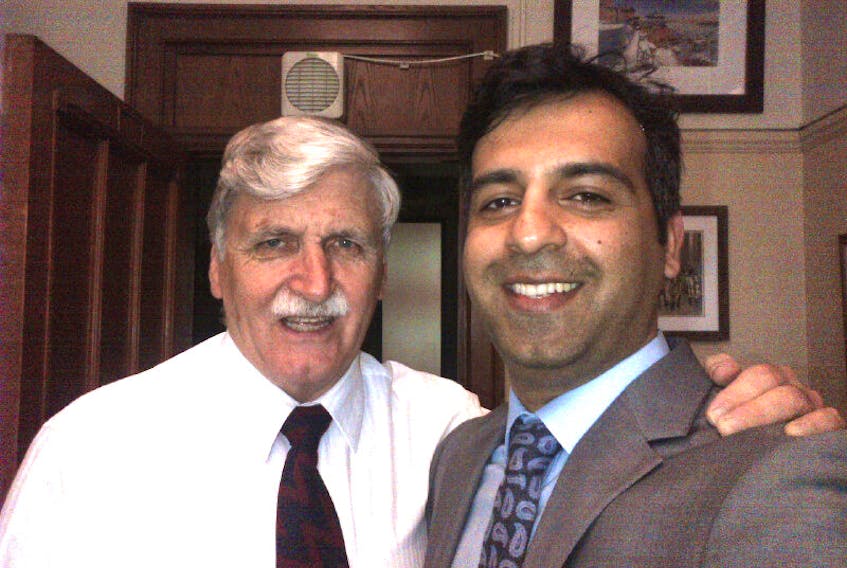ST. JOHN'S, N.L. — When Ajmal Pashtoonyar was two years old, his family fled their home in Jalalabad, Afghanistan, because the Soviet-backed communist government was targeting intellectuals.
His father was a physician and his mother was a physiotherapist, so they had no choice but to leave. They moved to Peshawar, Pakistan.
Much like today’s Syrian refugees face limitations on their education in Lebanon and Jordan, Afghan refugee students in Pakistan didn’t have equal post-secondary opportunities at the time, when Pashtoonyar was thinking about his future.
“At the time, Afghanastan was going through a really harsh civil war, and the Taliban were in control. There was very few opportunities for students to pursue anything except to seek refuge,” recalls Pashtoonyar.
Luckily for him, he learned about the World University Service of Canada’s (WUSC) Student Refugee Program (SRP).
Its youth-to-youth sponsorship model brings more than 130 refugee students per year to a Canadian university to study.
He applied, and in the fall of 1998, he was brought to the Burin campus of the College of the North Atlantic by the college.
Pashtoonyar recalls looking out a window at the college during his first winter in Newfoundland and seeing people playing ice hockey, and ice fishing on a nearby pond.
“These are lifelong memories that I cherish because I am a Newfoundlander in my heart,” he says.
Still, Pashtoonyar recalls a difficult transition from life as a refugee to living in rural Newfoundland, but his principal at the Burin Campus, Blake Cryderman, mentored him.
“I was missing family and, you know, I was young. And he said, ‘Remember to bloom where planted.’ And each time I see him – and I know he’s still proud of me – I remind him that I’m blooming,” Pashtoonyar’s says, his voice cracking with emotion.
“To be given that opportunity to continue my post-secondary education, and to come to Canada and to be part of this society was a life-changing experience. Each step that I take, and the achievements that I’m able to get, it all goes back to that small investment that students did at Burin campus.”
Approved plan
Wednesday evening, students at Memorial University voted to bring the Student Refugee Program to Memorial University, with funding through a $2-per-student levy each semester.
Ninety-three per cent of those who voted said yes to the program and the levy — 2,923 yes votes out of 3,142 votes cast.
Community health graduate student Nabila Qureshi, co-chair of the WUSC committee at Memorial University, said that when the results were announced at the Breezeway, students jumped and shouted with excitement.
“I think we have demonstrated that we do have an interest in advocating for a cause like this as an institution, and we have recognized the importance and value of an education. And we have acknowledged that $2 really can change someone’s life,” Qureshi said.
After Pashtoonyar’s first year at the College of the North Atlantic, he transferred to Memorial University, where he completed undergraduate studies, then went on to graduate from the University of Ottawa's law school.
He has worked with the United Nations (UN) Development Program in Kenya, contributed to the UN's African youth development initiatives in Uganda and Ethiopia, and worked with the UN High Commissioner for Refugees in Geneva, and drafted the agency's first policy paper on refugee youth empowerment.
In 2011, Pashtoonyar was a visiting professional at the International Criminal Court, where he supported the prosecutor's office's ongoing preliminary examination of the Afghanistan situation.
Prior to that, he was justice-sector officer on the Afghanistan task force at Foreign Affairs Canada, working directly with the Canadian Embassy in Kabul on transitional justice issues.
Today he is a policy adviser with Global Affairs Canada.
He said those experiences are “a reflection of what an investment in a refugee student can bring about.”
In 1994, Pashtoonyar visited his hometown in Afghanistan, and found his family home levelled.
He saw children missing limbs, innocent victims of the millions of land mines left by the Soviets.
He saw people homeless, hungry and suffering.
It is young people fleeing such situations, eager for education, who Memorial University students will help.
Qureshi said the university will welcome its first student refugee through the WUSC program in fall 2020.
Twitter: @juanitamercer_









